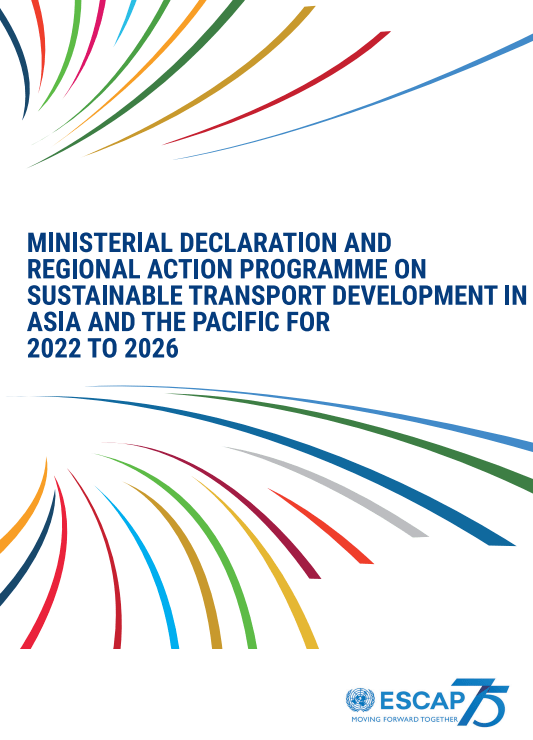21 November 2023 In Asia, Blog Post
Advancing the Goals of the Paris Agreement through Regional Cooperation
By Wei-Shiuen Ng, United Nations Economic and Social Commission for Asia and the Pacific (ESCAP)
Member States of the United Nations Economic and Social Commission for Asia and the Pacific (ESCAP) across the Asia Pacific region have shown different priorities and challenges on their path to reduce transport carbon emissions. From landlocked countries to small island developing states, from electric buses to sustainable maritime transport connectivity, countries have demonstrated the possibilities of low carbon transport action and their commitment to advance the goals of the Paris Agreement.
The adoption of the Paris Agreement by 196 countries in 2015 has created a political momentum for climate change mitigation across all sectors, which resulted in countries submitting their plans for climate action known as Nationally Determined Contributions (NDCs). Its goal is to limit global warming to well below 2, preferably to 1.5 degrees Celsius, compared to pre-industrial levels. Out of the 194 countries that have submitted their NDCs, 98% have mentioned transport, while 81% of the NDCs include transport measures, yet only 17% have indicated specific transport carbon dioxide (CO2) mitigation targets.[1] Transport measures included in NDCs of ESCAP member States are primarily focused on the promotion of public bus transport, alternative energy sources and electric mobility. The implementation of the Paris Agreement will require economic and social transformation in all sectors, including the transport sector, which contributes to 24% of direct CO2 emissions from fuel combustion globally.[2] Despite the significant role the transport sector plays in mitigating the impact of climate change, transport ministries are usually not directly involved in the process of developing NDCs, which can be attributed to a lack of institutional mechanisms to engage transport stakeholders and policymakers in the process.
As a result, a specific activity on the establishment of a regional cooperation mechanism to promote low carbon transport, including a shift to electric mobility and clean energy technologies to contribute to transport emissions reductions was included in the Regional Action Programme for Sustainable Transport Development in Asia and the Pacific (2022–2026) adopted by ESCAP member States. The Regional Cooperation Mechanism was launched in 2022 and has consulted almost 30 countries over the past year on how ESCAP can continue to provide support and assistance in the development and implementation of their low carbon transport, as well as how countries could further strengthen collaboration and cooperation when working towards common goals. Through new activities and existing intergovernmental processes for transport, ESCAP has identified ways to accelerate collaborative efforts on low carbon transport action, including the planning of the first regional meeting of the Regional Cooperation Mechanism in the margins of the Asia Pacific Climate Week in November 2023. Countries have identified priority topics for in-depth analysis and technical assistance in the
next phase of the Regional Cooperation Mechanism due to existing gaps in the technical, institutional and financial support that they are currently experiencing in the transition to low carbon transport. These priority topics reflect common pressing needs of countries in Asia and the Pacific and include the development and implementation of low carbon transport targets and timelines, green transport corridors and the identification of transport and climate financing mechanisms.
Although the Asia Pacific region is experiencing growing transport demand and rising CO2 emissions, it has the potential to provide support for achieving economies of scale for emerging low carbon transport technologies and systems, while influencing global climate action at the same time. Stronger collaboration in the Asia and Pacific region can therefore accelerate climate action as countries start to implement the Paris Agreement at the national level through the development of transformational plans. It contributes to the identification of regional and national priorities, while aligning with global decarbonising transport efforts. Regional collaboration has also been recognised as a key catalyst for global progress and will play an increasingly critical role to advance the goals of the Paris Agreement. Hence, a sectoral and regional collaboration approach can harmonise national climate and transport goals, while enhancing the influential role countries in Asia and the Pacific play in global climate change and transport policy processes.
[1] International Transport Forum, OECD, (2023), “Transport NDC Tracker”, https://www.itf-oecd.org/ndc-tracker/en.
[2]International Transport Forum, OECD (2023), “ITF Transport Outlook 2023”, https://www.oecd.org/regional/itf-transport-outlook-25202367.htm.

Wei-Shiuen Ng
Wei-Shiuen Ng is an Economic Affairs Officer in the Transport Division at the United Nations Economic and Social Commission for Asia and the Pacific (ESCAP), where she leads the development of low carbon and inclusive transport projects and initiatives. Prior to joining ESCAP, she was Advisor to the Secretary General on Sustainable Transport and Global Outreach in the International Transport Forum at the Organisation for Economic Co-operation and Development in Paris, Adjunct Professor at the Paris Institute of Political Science (Sciences Po) and Associate at the World Resources Institute in Washington DC. Wei-Shiuen is a member of the Scientific Committee of the World Conference on Transport Research Society and co-chairs the Special Interest Group on Transport and Climate Change. She currently serves on the United States Transportation Research Board of the National Academies Committee on Transportation in the Developing Countries and Committee on Transportation Demand Management. Wei-Shiuen holds a Ph.D. in City and Regional Planning from the University of California, Berkeley, a Masters in Environmental Science from Yale University and a Bachelor of Science in Environmental Economics and Environmental Management from the University of York.
